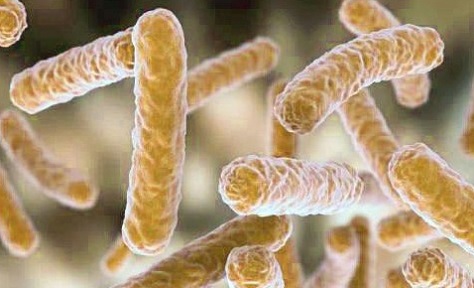Probiotics for Gut and Fatigue Relief: A Study on Lacticaseibacillus rhamnosus Strains
Nikhil Prasad Fact checked by:Thailand Medical News Team May 29, 2024 10 months, 3 weeks, 6 days, 53 minutes ago
Medical News: Lacticaseibacillus rhamnosus, a well-known probiotic, has been utilized to alleviate various metabolic, gastrointestinal, and psychological conditions. Its effectiveness, however, is highly strain-specific. In this comprehensive study that is covered in this
Medical News report, researchers from Shandong University and the Chinese Academy of Sciences explored the potential of 21 Ls. rhamnosus strains, identifying two strains with promising results for alleviating chronic fatigue syndrome (CFS) and irritable bowel syndrome (IBS) in mouse models.
 Probiotics for Gut and Fatigue Relief: A Study on Lacticaseibacillus rhamnosus Strains
Understanding Chronic Fatigue Syndrome and Irritable Bowel Syndrome
Probiotics for Gut and Fatigue Relief: A Study on Lacticaseibacillus rhamnosus Strains
Understanding Chronic Fatigue Syndrome and Irritable Bowel Syndrome
CFS and IBS are complex and globally prevalent conditions. CFS affects 3-20% of the population, characterized by excessive fatigue, cognitive dysfunction, and immune alterations, often accompanied by gastrointestinal issues. IBS, affecting 5-10% of the population, leads to functional gastrointestinal disorders and significantly impacts quality of life. Notably, over 58% of CFS patients also meet the criteria for IBS, indicating a strong link between these conditions.
Probiotic Potential of Lacticaseibacillus rhamnosus
Clinical studies and medical practice have demonstrated that probiotics, including Ls. rhamnosus, can effectively alleviate symptoms of CFS and IBS. Notably, strains like LGG and HN001 have shown to enhance the intestinal barrier and modulate the immune system. However, the efficacy of these probiotics is strain-specific, with some strains proving ineffective in certain cases.
The Study: Exploring Ls. rhamnosus Strains
In this study, 21 strains of Ls. rhamnosus were obtained from the intestines of healthy volunteers. The genomes of these strains were sequenced, and their phenotypic characteristics were analyzed, focusing on carbohydrate assimilation and antibiotic resistance. Two strains, WL11 and WL17, were identified as promising probiotics based on their growth rates, tolerance to acidity/alkalinity, bile acid production, and competition with pathogenic microbes.
Genomic and Phenotypic Characterization
The study's genomic analysis revealed that Ls. rhamnosus has a diverse genetic makeup, with a pan-genome of 5197 orthologs and a core-genome of 1270 orthologs. This diversity was further evident in the strains' carbohydrate utilization capabilities and antibiotic resistance. The phenotypic analysis confirmed the strains' ability to produce health-promoting metabolites such as short-chain fatty acids (SCFAs), essential for intestinal health.
Probiotic Efficacy in Mouse Models
The selected strains, WL11 and WL17, were tested in mouse models for their effectiveness in alleviating CFS and IBS symptoms.
-Alleviating IBS Symptoms
The study evaluated the beneficial effects of WL11 and WL17 on WAS-ind
uced IBS in mice. The results showed that these strains significantly alleviated symptoms such as slow body weight gain, visceral hypersensitivity, and anxiety-like behaviors. Strain WL17, in particular, restored body weight gain and reduced anxiety-like behaviors, demonstrating its potential in modulating the hypothalamic-pituitary-adrenal axis.
Alleviating CFS Symptoms
The strains were also tested for their effects on sleep deprivation-induced CFS in mice. The results indicated that WL17 significantly improved motor coordination, memory cognition, and anxiety-like behavior in CFS mice. Additionally, it reduced levels of pro-inflammatory cytokines (TNF-α and IL-6) and oxidative stress markers (MDA), suggesting its role in modulating immune and oxidative stress responses.
Discussion: The Promise of WL11 and WL17
The study highlights the potential of WL11 and WL17 in alleviating both CFS and IBS symptoms. These strains produce SCFAs, which are crucial for intestinal health and can cross the blood-brain barrier to affect brain function. The ability of these strains to degrade complex carbohydrates ensures their successful colonization and survival in the intestinal environment, contributing to their probiotic efficacy.
Conclusion
This study identified 21 strains of Ls. rhamnosus and characterized their genomic and phenotypic features. Among them, WL11 and WL17 showed significant potential in alleviating CFS and IBS symptoms in mouse models. While these findings are promising, further clinical trials are necessary to confirm their effectiveness in human patients. The multifunctionality of these strains could provide comprehensive health benefits, making them valuable additions to probiotic products.
In summary, the research presents new insights into the probiotic potential of Ls. rhamnosus strains, paving the way for future studies and applications in improving gut health and alleviating fatigue-related conditions.
The study findings were published in the peer reviewed journal: Microorganism.
https://www.mdpi.com/2076-2607/12/6/1081
For more on probiotics, keep on logging to Thailand
Medical News.
Read Also:
https://www.thailandmedical.news/news/health-news-scientists-identify-two-probiotics-bifidobacterium-lactis-and-lactobacillus-rhamnosus-that-can-treat-hypertension
https://www.thailandmedical.news/news/u-s-clinical-trial-shows-that-probiotics-like-lactobacillus-rhamnosus-gg-can-reduce-covid-19-symptoms-when-taken-as-a-post-exposure-prophylaxis
https://www.thailandmedical.news/news/covid-19-news-probiotics-such-as-limosilactobacillus-fermentum-and-lacticaseibacillus-rhamnosus-can-help-against-sars-cov-2
https://www.thailandmedical.news/news/brazilian-study-review-finds-that-probiotic-lactobacilli-has-therapeutic-potential-in-treating-covid-19
https://www.thailandmedical.news/news/university-of-north-carolina-study-finds-that-probiotics-in-kombucha-found-to-emulate-fasting-and-decrease-fat-stores-in-c-elegans-model
https://www.thailandmedical.news/news/covid-19-news-indonesian-researchers-uncover-biosurfactant-potential-and-antiviral-activity-of-multistrain-probiotics-against-sars-cov-2
